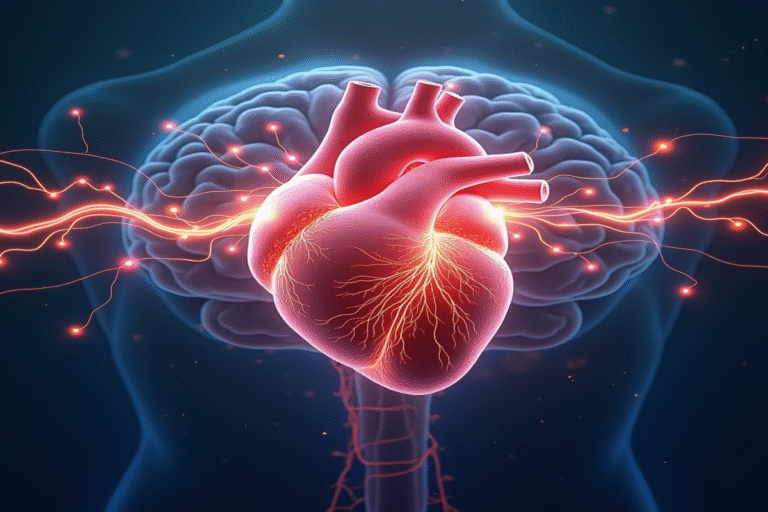Did you know your heart and brain are constantly engaged in a sophisticated conversation? While we often think of the brain as the body’s command center, the reality is even more fascinating. Your heart and brain maintain an ongoing dialogue through a complex network of electrical signals, hormones, and neural connections that influence everything from your emotions to your physical health.
The Hidden Electrical Highway
At the core of this heart-brain communication is a remarkable electrical network. Your heart is not just a mechanical pump—it contains its own complex nervous system, often called the “heart brain” or intrinsic cardiac nervous system, which has around 40,000 neurons. This system can sense, process information, and even initiate actions independently of the brain.
The vagus nerve is the main communication channel between these organs, carrying signals in both directions through what scientists call the “vagal pathway.” This two-way highway transmits electrical impulses that help your heart and brain coordinate their activities and respond to stress and changes together.
Your Heart Speaks, Your Brain Listens
Surprisingly, your heart sends more signals to your brain than your brain sends to your heart. With each beat, your heart transmits important information about your body’s state:
- Pressure sensors in your heart detect blood flow and pressure, informing your brain about cardiovascular function.
- Chemical sensors monitor blood composition, including oxygen and hormone levels.
- Rhythm patterns from your heartbeat create distinctive electrical signals that can influence brain activity.
These cardiac signals affect brain areas responsible for emotions, decision-making, and stress responses. When you’re anxious, your heart rhythm becomes erratic, sending signals that heighten brain alertness. During calm states, your heart produces smooth, coordinated rhythms that help your brain function more effectively.
Heart Rate Variability: The Conversation’s Fingerprint
One of the most fascinating aspects of this communication is heart rate variability (HRV)—the tiny changes in time between each heartbeat. Rather than beating like a metronome, a healthy heart shows complex variability that reflects the dynamic connection between heart and brain.
High HRV indicates a resilient and adaptable communication system, while low HRV can point to an imbalance linked to stress, anxiety, and certain health challenges. By analyzing these beat-to-beat changes, researchers can assess the quality of your heart-brain interaction.
Emotions: The Heart’s Language
When you feel emotions, your heart doesn’t just respond passively—it actively participates in creating those feelings. Positive emotions like joy, gratitude, and love create harmonious heart rhythms that boost brain function, enhance thinking, and strengthen your immune response. Negative emotions cause chaotic rhythms that can impair mental clarity and drain energy.
This is why we often physically “feel” emotions in our chest. That sensation of heartache during grief or the warmth of love are not just metaphors—they reflect real changes in your heart’s electrical patterns that communicate emotional states to your brain.
The Science of Coherence
Researchers at the HeartMath Institute have found that when the heart and brain reach a state called “coherence,” remarkable things occur. In coherence, heart rhythms become smooth and ordered, brain waves synchronize, and these two organs operate in harmony. Studies show that this state promotes:
- Better cognitive performance and problem-solving abilities
- Improved emotional regulation and stress resilience
- Stronger immune function and overall health
- Greater social connection and empathy
Perhaps most amazing, you can consciously improve this conversation. Techniques like slow, deep breathing, focusing on positive emotions, and meditation can bring your heart into a coherent rhythm, sending calming signals to your brain and enhancing your overall well-being.
Beyond Individual Health
The implications of the heart-brain connection go beyond personal health. New research suggests our hearts may detect and react to events before our conscious minds do. Some studies show the heart can register emotional stimuli milliseconds before the brain, opening new questions about intuition and decision-making.
Even more intriguing, scientists are exploring whether heart rhythms from one person can influence people nearby—hinting at forms of communication we’re only beginning to understand.
This hidden electrical conversation between your heart and brain reveals one of the body’s most beautiful symphonies—a constant exchange of signals that shapes your human experience in ways science is still discovering. Next time you feel your heart race or slow down, remember: it’s not just pumping blood—it’s communicating with your brain and helping create the foundation of your conscious life.





